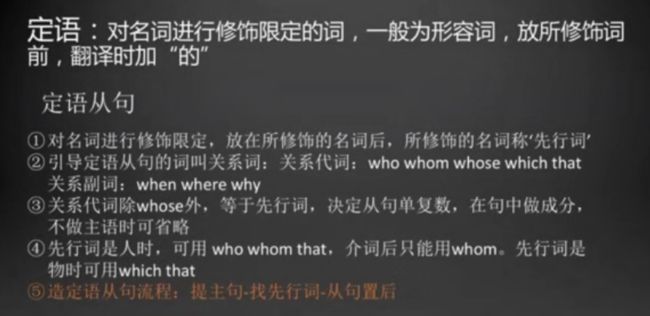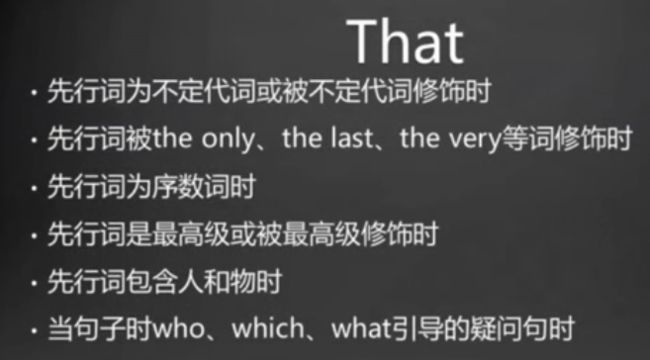一 限制性定语从句
(1)限制性定语从句的介绍
举例:
- 住我们隔壁的那个人是我的老师---that person who lives by us is my teacher.
- 我从来没有见过你跟我说过的那个人。
i have never seen that person who/whom/that you told me about.(第一种表达:一般的表述)
i have never seen that person who/whom/that you told with me.(第二种表达:先行词做told的宾语)
i have never seen that person about whom you told me.(第三种表达:介词提前)
- 他是你昨天在街上碰到的人吗---is he the person who /whom/that you met on the street yesterday?
- 你昨天买的鸡蛋不新鲜---the eggs that/which you bought yesterday are off.
注:从句+先行词 是句子结构完整的第二句话(主句是结构完整的第一句话)。
(2)只用that的情况
常用的不定代词如下:
举个例子:
- 这是我知道的全部---this is all that i know.(这里的that可以不写,因为在从句中做宾语成分)
- 任何人想学好英语必须努力学习---anyone that wants to learn english well must study hard.
- 他是唯一能做这个工作的人---he is the only person that can do this job.
- 这是我想说的第一件事---this is the first thing that I want to say.
- 我见过的最有责任感的医生是他---the most responsible doctor that I have seen is him.
- 他谈到了他感兴趣的人和书---he speaks of the books and people that he is interested in .
- 那个白头发的人是谁---who is the person that is with white hair.
(3)whose
表示“谁的”,举例如下:
- 我见过那个黄头发的人---i have seen that person whose hair is yellow===i have seen that person who has yellow hair.
- 请把那本蓝色封皮的书递给我---please pass me the book whose cover is blue.
(4)关系副词(后边是完整结构的句子)
关系副词只有三个:“when,where ,why”。其中当表示“与时间,地点,原因有关时”,介词+which===关系副词。举例如下:
- 我仍然记得我第一次来这里的那天。
i still remember the day when i first came here.
i stll remember the day on which i first came here.
i stll remember the day which/that i first came here on .
- 这就是我上一年住的地方。
this is the place where i lived last year.
this is the place in which i lived last year.
this is the place which/that i lived in last year.
我不知道他今天看起来不高兴的原因。
i do not know the reason why he looked unhappy today.
i do not know the reason for which he looked unhappy today.(why 只能用for + which代替)
i do not know the reason which/that he looked unhappy for today.
注:什么时候用关系代词;什么时候用关系副词的快速判断
- 先行词在从句中作宾语,主语或者说作从句中的成分的时候,用关系代词,不用加任何介词。
- 先行词不在从句中作宾语,主语或者说作从句中的成分的时候,并且与“时间 地点 原因”有关系的时候,用关系副词,不与“时间 地点 原因”有关系的时候,记得从句要加介词或者关系代词(whom,which)前加介词。
举一个只能用介词+关系代词的情况:
- 这不是我想听的理由。
this is not the reason which/that i do not want to listen to.
this is not the reason to which i do not want to listen.(因为不是for+which,所以不能用why代替)
二 非限制性定语从句
非限制性定语从句的讲解主要是与限制性定语从句的对比来展开:
(1)关系词不同
- 关系词that和why可用于限制性定语从句中,通常不用于非限制性定语从句;
- 在限制性定语从句中,关系词有时可以省略,而在非限制性定语从句中关系词一律不省略。
(2)先行词不同
- 限定性定语从句的先行词只能是名词或代词,而非限定性定语从句的先行词则可以是名词或代词,也可以是短语或句子;
- 当先行词为专有名词或其他具有独一无二性的普通名词时,通常要用非限制性定语从句,而不用限制性定语从句。
举例如下:
Peter drove too fast, which was dangerous. 彼得开车很快,这是很危险的。(which指drive too fast)
He changed his mind, which made me very angry. 他改变了主意,这使我很生气。(which指整个主句)
Mr. Smith, who is our boss, will leave for Japan next week. 我们的老板史密斯先生下周要去日本。(先行词为专有名词,要用非限制性定语从句修饰)
Her father, who has a lot of money, wishes her to study abroad. 她父亲很有钱,希望她出国学习。(先行词为表独一无二意义的普通名词,要用非限制性定语从句修饰)
(3)形式不同
- 限定性定语从句主句和从句之间不用逗号隔开,口语中使用时也不停顿;
- 非限定性定语从句与主句之间通常有逗号隔开,口语中使用时有停顿。
(4)功能不同
- 限定性定语从句用于对先行词的意义进行修饰、限制和识别,如果去掉,就会造成句意不完整或概念不清;
- 而非限定性定语从句用于对先行词起补充说明作用,如果省略,句意仍然清楚、完整。
举例如下:
People who take physical exercise live longer. 进行体育锻炼的人活得长些。(若把从句去掉句子就失去意义)
His daughter, who is in Boston now, is coming home next week. 他女儿现在在波士顿,下星期回来。(若把从句去句子意义仍然完整)
(5)含义不同
比较下面的两个句子:
I have a sister who is a doctor. 我有一个医生的姐姐。(姐姐不止一个)
I have a sister, who is a doctor. 我有一个姐姐,她是当医生的。(只有一个姐姐)
(6)翻译不同
- 限定性定语从句翻译在它所修饰的先行词之前,
- 非限定性定语从句与主句分开翻译。
举例如下:
He is the man whose car was stolen. 他就是汽车被窃的那个人。
I’ve invited Jim, who lives in the next flat. 我邀请了吉姆,他就住在隔壁。


